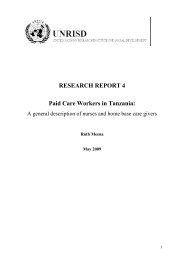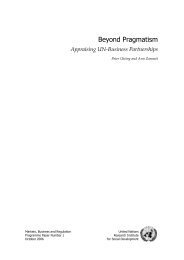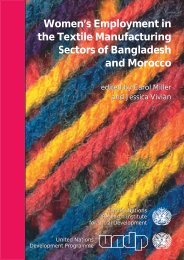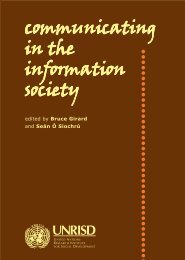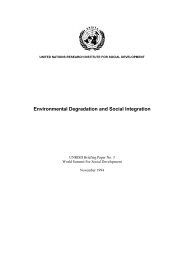The Politics of Gender and Reconstruction in Afghanistan
The Politics of Gender and Reconstruction in Afghanistan
The Politics of Gender and Reconstruction in Afghanistan
Create successful ePaper yourself
Turn your PDF publications into a flip-book with our unique Google optimized e-Paper software.
EVOLVING INSTITUTIONAL FRAMEWORKS AND WOMEN’S RIGHTS: POTENTIALS AND LIMITATIONS<br />
• Two vice-presidents were to be elected, <strong>in</strong>stead <strong>of</strong> one, to allow for greater ethnic representation <strong>in</strong> the<br />
executive branch. This <strong>in</strong>creases the possibility <strong>of</strong> a woman act<strong>in</strong>g as vice-president.<br />
• <strong>The</strong>re are articles specifically referr<strong>in</strong>g to rights <strong>of</strong> access to public services such as education <strong>and</strong> health.<br />
<strong>The</strong>re are, nonetheless, several areas that leave room for <strong>in</strong>terpretation <strong>and</strong> contention. Article 7 <strong>of</strong> the<br />
Constitution requires that the state <strong>of</strong> <strong>Afghanistan</strong> “abide by the UN Charter, <strong>in</strong>ternational treaties, <strong>in</strong>ternational<br />
conventions that <strong>Afghanistan</strong> has signed, <strong>and</strong> the Universal Declaration <strong>of</strong> Human Rights”. Not only<br />
are the mechanisms through which compliance may be monitored not specified, but there may be potential<br />
contradictions with other articles.<br />
Article 3 on “Islam <strong>and</strong> Constitutionality” states that “In <strong>Afghanistan</strong>, no law can be contrary to the beliefs<br />
<strong>and</strong> the provisions <strong>of</strong> the sacred religion <strong>of</strong> Islam”, dropp<strong>in</strong>g the orig<strong>in</strong>al word<strong>in</strong>g <strong>in</strong> the draft referr<strong>in</strong>g to “the<br />
sacred religion <strong>of</strong> Islam <strong>and</strong> the values <strong>of</strong> the Constitution” (emphasis added). This article, along with its affiliate<br />
which declares <strong>Afghanistan</strong> an Islamic state, is not subject to amendment. 37 <strong>The</strong> Constitution gives the Supreme<br />
Court the authority to determ<strong>in</strong>e whether laws <strong>and</strong> treaties made by the government are <strong>in</strong> accordance with<br />
the Constitution, giv<strong>in</strong>g it the power to reject any law or treaty deemed un-Islamic. Dur<strong>in</strong>g the deliberations,<br />
jihadi groups proposed major changes that would have made the Supreme Court’s <strong>in</strong>terpretation <strong>of</strong> Islam override<br />
most <strong>of</strong> the provisions <strong>of</strong> the constitution. Although these were largely defeated, Thier (2004a) cautions that a<br />
Supreme Court dom<strong>in</strong>ated by fundamentalists could become an unaccountable body controll<strong>in</strong>g the legislature,<br />
executive branch <strong>and</strong> electoral system on the pretext <strong>of</strong> protect<strong>in</strong>g Islam, <strong>in</strong> a manner rem<strong>in</strong>iscent <strong>of</strong> the<br />
Council <strong>of</strong> Guardians <strong>in</strong> Iran. 38<br />
<strong>The</strong>se difficulties must be put <strong>in</strong> the context <strong>of</strong> the compromises made necessary by a central dilemma that<br />
threatened to stalemate the proceed<strong>in</strong>gs <strong>of</strong> the CLJ: the choice between a strong presidential system <strong>and</strong> a parliamentary<br />
system. <strong>The</strong> draft presented by the government proposed a pure presidential system, while the<br />
opposition from jihadi groups <strong>and</strong> non-Pashtun areas <strong>of</strong> the country favoured a parliamentary one. <strong>The</strong> CLJ saw<br />
the Pashtuns rally around a presidential system with a strong central government. This was countered by a power<br />
bloc <strong>of</strong> non-Pashtuns <strong>in</strong> northern <strong>and</strong> northeastern <strong>Afghanistan</strong> (Uzbeks, Tajiks, Turkmens <strong>and</strong> Hazaras) who<br />
found common ground around dem<strong>and</strong>s for more prov<strong>in</strong>cial autonomy <strong>and</strong> greater checks on presidential powers.<br />
<strong>The</strong> articles perta<strong>in</strong><strong>in</strong>g to <strong>of</strong>ficial languages (Article 16) <strong>and</strong> to presidential powers (Article 64) reflect these tensions.<br />
Article 64 was amended to enhance parliamentary powers. Grant<strong>in</strong>g broader language <strong>and</strong> cultural<br />
rights to the various ethnic groups compos<strong>in</strong>g the nation <strong>and</strong> declar<strong>in</strong>g <strong>Afghanistan</strong> an “Islamic republic” have<br />
been among the means <strong>of</strong> defus<strong>in</strong>g the fundamental conundrum <strong>of</strong> politics <strong>in</strong> <strong>Afghanistan</strong>: the relations between<br />
the political centre <strong>and</strong> an ethnically diverse periphery that resists the overlordship <strong>of</strong> Pashtun state elites.<br />
37 About a hundred delegates close to the Jam’iyat-e-Eslami (Islamic League) threatened that they would refra<strong>in</strong> from tak<strong>in</strong>g part <strong>in</strong> the meet<strong>in</strong>gs if the form<br />
<strong>of</strong> government were not specified before the 10 specialist committees commenced their work on the draft Constitution. Almost half <strong>of</strong> this group<br />
absta<strong>in</strong>ed from attend<strong>in</strong>g the meet<strong>in</strong>gs when deliberations on the Constitution began. It is therefore clear that the potential for dissent was enormous<br />
on this issue.<br />
38 <strong>The</strong> test case for this type <strong>of</strong> concern came 10 days after the ratification <strong>of</strong> the Constitution when the performance <strong>of</strong> a pop s<strong>in</strong>ger, Salma, on Kabul<br />
television was deemed un-Islamic <strong>and</strong> therefore illegal by the Supreme Court. Both the M<strong>in</strong>ister <strong>of</strong> Culture <strong>and</strong> MOWA have been quoted as po<strong>in</strong>t<strong>in</strong>g<br />
out that the actions <strong>of</strong> the Supreme Court were not <strong>in</strong> conformity with its legal m<strong>and</strong>ate, <strong>and</strong> state television flouted the <strong>in</strong>junction. <strong>The</strong> <strong>in</strong>cident underscores,<br />
nonetheless, both the value <strong>of</strong> an explicit Constitutional commitment to equal rights <strong>and</strong> the political obstacles that may lie <strong>in</strong> the way <strong>of</strong> its<br />
implementation. Political will at the highest level needs to be exercised <strong>in</strong> the appo<strong>in</strong>tment <strong>of</strong> Supreme Court judges to ensure that the egalitarian<br />
spirit <strong>of</strong> the Constitution is not diluted <strong>and</strong> rendered <strong>in</strong>operative.<br />
PAGE 21




